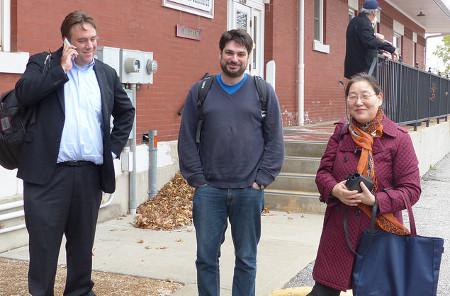Democracy International: In your opinion, why do we need to democratise the world?
Joe Mathews: We don't need to democratize the world. People around the world need to work to build democratic culture and infrastructure in their own communities and countries. We have had democratization in the shallow sense of elections, and even direct democratic votes. But in too many places in the world, democratic culture is weak because there are not enough ways for people to participate.

What is your view of the European Citizens' Initiative?
It's a weak showpiece of transnational democracy. It hasn't been very effective, even at getting attention. It needs teeth - the requirement of an up or down vote by the commission, maybe, or even a vote of the public if the Europeans ever get serious about true European-wide democracy. And honestly, European citizens need to come up with some smarter ideas and push through the process-initiatives that drive debate not only in Europe but also globally. There's a real failure to apply European imagination to the process.
The gap between the rich and the poor is increasing. Do you see a connection between the social economic crisis and citizens’ participation? What should be done to fight this development?
The premise of your question is wrong, if you are asking it globally. In Germany and the U.S. and wealthy countries, this is a problem, with many causes, some related to democracy and participation, some not. In most of the rest of the world, things are getting better, the middle class is growing, so many people are moving out of poverty, becoming healthier, wealthier, better educated.
The world has never been more peaceful. So I'm not sure what social or economic crisis you're talking about. In the world's countries where we see dictatorship and oppression and isolation from the rest of the world - Venezuela, Zimbabwe, Somalia, North Korea - you're seeing crisis and decline, so there's a connection there, at the very bottom of the global barrel. But the obsession with income inequality is a luxury enjoyed by people in wealthy societies.
In your life, what triggered your activism for more democracy and citizen participation? Was there a key moment in your life?
I don't see myself as an activist; I confess that I am wary of people who label themselves that way - too often they are merely salesmen, offering propaganda and jargon, rather than asking questions and listening. And so they do more harm than good. I see myself as a writer and journalist who asks questions. In California, where I live, we like to think of ourselves as very democratic, even though we aren't very democratic at all - and our peculiar system of direct democracy works against participation. It's my role to pose questions that give Californians a chance to see ourselves as we really are.
One way I do that is by trying to get Californians, and Americans, to look at how the rest of the world practices democracy. We don't look very good by comparison, and I do think people are slowly beginning to realize what laggards we are. Whether we'll do anything significant about our democratic failures is far from clear.
What is the next political goal you want to achieve?
I don't think about specific political goals - I think that kind of focus on a particular political achievement has been harmful in California, as we too often look to make one change, or pass one ballot initiative, and then we're disappointed with the result. The world is complicated, so change has to be bigger and multi-faceted.
I'm focused on building infrastructure - around the world, helping Bruno Kaufmann with the Global Forum on Modern Direct Democracy network, and here in the U.S., Zocalo Public Square, our nonprofit Ideas Exchange that combines daily journalism with free, public events. Our goal is to ask questions, and include people and ideas in the public square, so that our shared civic life and and culture is stronger and more inclusive.
What should Democracy International do to realise more democracy and citizen participation in the world?
Listen. And be present - to provide advice, guidance, connections, knowledge and resources to people all over the world who are working for democracy in the local context. Democracy is fundamentally about showing up; Democracy International needs to show up, and help others show up.
interviewed by Cora Pfafferott, 25 March 2015

